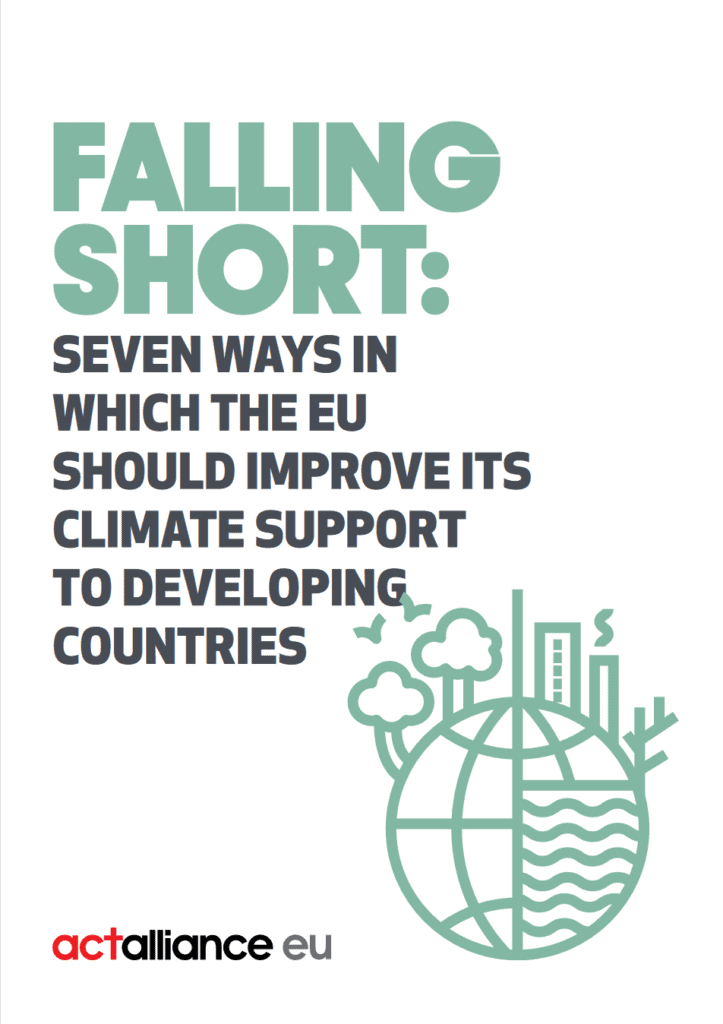On 3 September 2020, ACT Alliance EU published a new report on climate finance revealing that EU institutions are failing to meet their climate finance commitments. A policy shift is needed to ensure that developing countries receive the appropriate climate support to address the climate crisis. The report assesses climate finance channelled from the European Investment Bank, European Development Fund, and the European Commission, to developing countries. It reveals the decline in climate adaptation and grant-based financial support for the most climate-vulnerable countries.
Key Points
While overall commitments to climate finance by the EU institutions increased in 2018, it did so at a much slower rate than in previous years. In fact, while climate finance loans and equity from the European Investment Bank increased, climate finance grants managed and delivered by the European Commission (from the EU annual budget and the European Development Fund) decreased slightly from 2017 to 2018.
Data on the disbursement of climate finance (the amount actually paid out) is not accessible. The lack of proper reporting of climate finance disbursements makes it difficult to monitor if finance commitments have been fulfilled, which undermines trust.
Loans are reported by the EU to the UN as directly equivalent to grants, even though loans must be repaid, and have the potential to lead to climate debt. A loan is not a gift. It must be repaid, usually with interest. It should not be reported as if it were equal to a grant.
Less than one-third of climate finance reported by EU institutions went towards adaptation in 2018. Adaptation funding is desperately needed by some of the poorest, as they contend with the effects which climate change is already having in their countries. But mitigation gets 68% of climate finance as reported by the EU institutions in 2018, up from 67% in 2017. This is due to the share of climate finance reported by the European Investment Bank, which is overwhelmingly focused on mitigation. Adaptation only accounted for 8% of the EIB’s climate finance to developing countries.
The share of allocated climate finance going to least developed countries in 2018 fell, while the share going to upper middle-income countries increased. The purpose of global climate finance is that developed countries (who bear the greatest responsibility for causing climate change) should assist developing countries (who bear the least, and are often suffering the worst consequences). But the share of allocated climate finance going to the least developed countries declined from 20% in 2017 to 14% in 2018, and the percentage going to upper middle-income countries increased from 18% to 23%. In 2018, the total amount going to countries in Europe, including Turkey, was higher than the total going to least developed countries.
Figures showing the mobilisation of private sector finance by the EU are not transparent, and are available only in aggregate. This is problematic, because the EU states that these will be used towards the collective USD100 billion per year goal of climate finance flowing from developed to developing countries, but we have little insight into how these figures are calculated or who is receiving the funding.
The commitment to provide ‘new and additional’ funds should represent funds that go beyond preexisting commitments to provide development assistance, rather than merely funds that have not been double-counted. In reporting to the UN, the EU asserts that the financial resources reported are ‘new and additional’, because they were not already reported in previous years. But when the developed countries committed to providing ‘new and additional funds’ to combat climate change, this was an acknowledgement that the scale of the problem would require significant scaling up of financial resources. Climate change represents a challenge which goes beyond pre-existing development commitments- and which inevitably makes those efforts more difficult.
Recommendations
One: Climate finance by the European Commission, including the European Development Fund, is vital for developing countries, as it is 100% grant-based, targeted more towards adaptation, and better targeted towards least developed countries than European Investment Bank funding. The decline in grant funding should be reversed.
Two: The EU institutions should improve their reporting to ensure that data about disbursements is accurate and publicly available.
Three: The proportion of concessional loans provided by the EIB to developing countries as climate finance should be increased, and non-concessional loans should not be reported as grant equivalent. Only the ‘grant-equivalent’ of concessional loans should be reported, in line with new OECD reporting guidelines.
Four: Grant-based adaptation funding is vital for developing countries, and should be strongly prioritised by the EU institutions. The EU institutions must deliver on the Paris Agreement, and provide a better balance between mitigation and adaptation in their total support.
Five: The EU must ensure that the poorest and most vulnerable countries, including the least developed
countries, receive adequate support. The EU should ensure that climate finance allocation is transparent so that receiving countries are identified.
Six: Private finance should be transparent and accountable, and grant equivalent amounts should be included in the reporting. Private finance mobilised through EU public climate finance should be subject to human rights due diligence. Private investors must demonstrate that they are undertaking human rights due diligence on their investments, in line with the UN Guiding Principles on Business and Human Rights.
Seven: Climate finance needs to go beyond the existing commitments from developed countries to provide official development assistance. This means that climate finance should be counted separately from, and in addition to, official development assistance.
In this video, Mattias Söderberg, Chief Advisor at DanChurchAid and spokesperson on climate finance in ACT Alliance EU, explains the main findings of the report.
